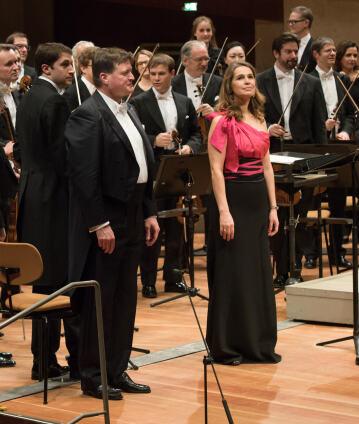Christian Thielemann conducts a concert “à la française”

This French programme with conductor Christian Thielemann presents itself as delicate and passionate. Ernest Chausson’s sumptuous song cycle Poème de l’amour et de la mer with mezzo-soprano Sophie Koch is followed by Debussy’s graceful dances for harp and strings. The climax is the peaceful Requiem by Gabriel Fauré, which culminates in a touchingly optimistic vision of the hereafter.
“Your Pie Jesu is the only Pie Jesu, just as Mozart’s Ave Verum is the only Ave Verum,” Camille Saint-Saëns wrote to his former student Gabriel Fauré in 1916. This was referring to the soprano solo from Fauré’s Requiem, first performed in 1888 and later revised; in 1924, it would also be played at the composer’s funeral. Fauré – lyricist par excellence – took an individual musical approach to the text of the medieval requiem. As the composer himself once explained: “It has been said that my Requiem does not express the fear of death, and someone has called it a lullaby of death. But it is thus that I see death: as a happy deliverance, an aspiration towards happiness above, rather than as a painful experience. […] Perhaps I have also instinctively sought to escape from what is usual, after all the years of accompanying burial services on the organ! I know it all by heart. I wanted to write something different.”
The temporal counterpart to Fauré’s consolatory Requiem is provided in these Berliner Philharmoniker concerts by Ernest Chausson’s Poème de l’amour et de la mer. Chausson, who was instructed in composition by Jules Massenet and César Franck, set poems by his friend Maurice Bouchor to music in this two-part composition, in terms of form somewhere between song cycle and cantata, and connected with an orchestral interlude. Composed between 1882 and 1890, the Poème de l’amour et de la mer was written at a time in which Chausson, after first visits to the Bayreuth Festival, was strongly inspired by Richard Wagner’s music. The subtle Wagnerisms contained in Chausson’s musical language, iridescent in every conceivable orchestral colour, are clearly heard in Christian Thielemann’s interpretation. Claude Debussy’s Danse sacrée et danse profane for harp and strings creates a thematic bridge between Fauré’s Requiem and Chaussons Poème.
© 2016 Berlin Phil Media GmbH
Related interview